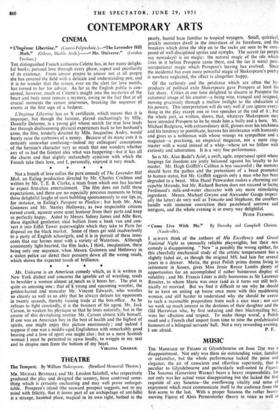THEATRE
The Tempest. By William Shakespeare. (Stratford Memorial Theatre.) MR. Michael_ BENMIALL and Mr. Loudon Sainthill, who respectively produced the play and designed the scenery, have contrived some- thing which is certainly enchanting and may well prove unforget- table. Prospero's island (the seaward prospect suggests, not to my mind with felicity, that it forms part of an archipelago of ant-hills) is a strange, haunted place, magical in its own right, bathed in the pearly, humid haze familiar to tropical voyagers. Small, quizzical, prickly monsters dwell in the interstices of its foreshore, and the breakers which drive the ship on to the rocks are seen to be com- posed of well-disciplined sprites and nymphs. The accent (as people say nowadays) is on magic: the natural magic of the isle which lives in it before Prospero came there, and the (as it were) post- occupational magic which Prospero's leaving has evolved. Since the incidental but even more powerful magic of Shakespeare's poetry is nowhere neglected, the effect is altogether happy.
Of the verbosity and the petulance which are often the by- products of political exile Shakespeare gave Prospero at least his fair share. Critics at one time delighted to discern in Prospero the autumnal image of his creator—a being wise, tranquil and resigned, moving graciously through a mellow twilight to the abdication of his powers. This interpretation will do very well if you ignore every- thing in the play except one or two speeches at the end of it ; but the whole part, as written, shows, that, whatever Shakespeare may have intended Prospero to be he made him a bully and a bore. Mr. Michael Redgrave, with extraordinary skill, glosses over his tetchiness and his tendency to pontificate, leavens his intolerance with humanity and gives us a nobleman with whose wrongs we sympathise and a magician—a practising, an empirical magician, not a mere ring- master with a wand instead of a whip—whose art we follow with curiosity and admiration. It is a very fine performance.
So is Mr. Alan Badel's Arid, a swift, agile, impersonal spirit whose longings for freedom are justly balanced against his loyalty to his master. Mr. Hugh Griffith's Caliban is less successful ; the monster should have the pathos and the pretensions of a beast promoted to human status, but Mr. Griffith suggests only a man who has been degraded to a beast. Miss Hazel Penwarden makes a charming and capable Miranda, but Mr. Richard Burton does not succeed in lacing Ferdinand's milk-and-water character with any more stimulating ingredient. Messrs. Michael Gwynn and Alexander Gauge (especi- ally the latter) do very well as Trinculo and Stephano, the courtiers handle with immense conviction their pasteboard sorrows and intrigues, and the whole evening is in every way delightful.
PETER FLEMING.


































 Previous page
Previous page